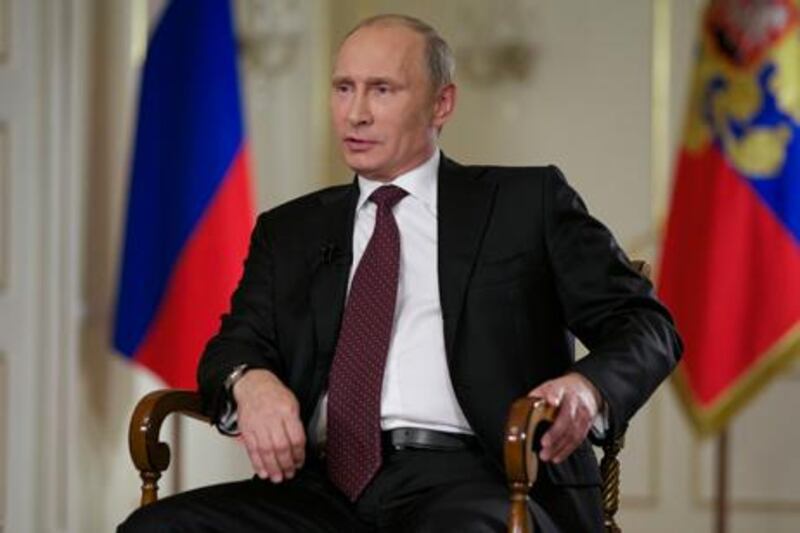Novo-Ogaryovo, Russia // President Vladimir Putin warned the West against taking one-sided action in Syria but also said Russia "doesn't exclude" supporting a UN resolution on punitive military strikes if it is proved that Damascus used poison gas on its own people.
In a wide-ranging interview with The Associated Press and Russia's state Channel 1 television, President Putin said Moscow has provided some components of the S-300 air defence missile system to Syria but has frozen further shipments. He suggested that Russia may sell the potent missile systems elsewhere if western nations attack Syria without UN Security Council backing.
The interview Tuesday night at the president's country residence outside the Russian capital was the only one he granted prior to the summit of G-20 nations in St Petersburg, which opens tomorrow. The summit was supposed to concentrate on the global economy but now looks likely to be dominated by the international crisis over allegations that the Syrian government used chemical weapons in the country's civil war.
Putin said he felt sorry that President Barack Obama cancelled a one-on-one meeting in Moscow that was supposed to have happened before the summit. But he expressed hope the two would have serious discussions about Syria and other issues in St Petersburg.
"President Obama hasn't been elected by the American people in order to be pleasant to Russia. And your humble servant hasn't been elected by the people of Russia to be pleasant to someone either," he said of their relationship.
"We work, we argue about some issues. We are human. Sometimes one of us gets vexed. But I would like to repeat once again that global mutual interests form a good basis for finding a joint solution to our problems," Mr Putin said.
He also denied that Russia has anti-gay policies - an issue that has threatened to embarrass the country as it prepares to host the Winter Olympics in February.
The Russian leader, a year into his third term as president, appeared to go out of his way to be conciliatory amid a growing chill in US-Russian relations. The two countries have sparred over Syria, the Edward Snowden affair, Russia's treatment of its opposition and the diminishing scope in Russia for civil society groups that receive funding from the West.
Mr Putin said it was "ludicrous" that the government of President Bashar Assad - a staunch ally of Russia - would use chemical weapons at a time when it was holding sway against the rebels.
"From our viewpoint, it seems absolutely absurd that the armed forces, the regular armed forces, which are on the offensive today and in some areas have encircled the so-called rebels and are finishing them off, that in these conditions they would start using forbidden chemical weapons while realizing quite well that it could serve as a pretext for applying sanctions against them, including the use of force," he said.
The Obama administration says 1,429 people died in the Aug. 21 attack in a Damascus suburb. Casualty estimates by other groups are far lower, and Assad's government blames the episode on rebels trying to overthrow him. A UN inspection team is awaiting lab results on tissue and soil samples it collected while in Syria before completing a report.
"If there are data that the chemical weapons have been used, and used specifically by the regular army, this evidence should be submitted to the UN Security Council," added Putin, a former officer in the Soviet KGB. "And it ought to be convincing. It shouldn't be based on some rumors and information obtained by special services through some kind of eavesdropping, some conversations and things like that."
He noted that even in the US, "there are experts who believe that the evidence presented by the administration doesn't look convincing, and they don't exclude the possibility that the opposition conducted a premeditated provocative action trying to give their sponsors a pretext for military intervention."





